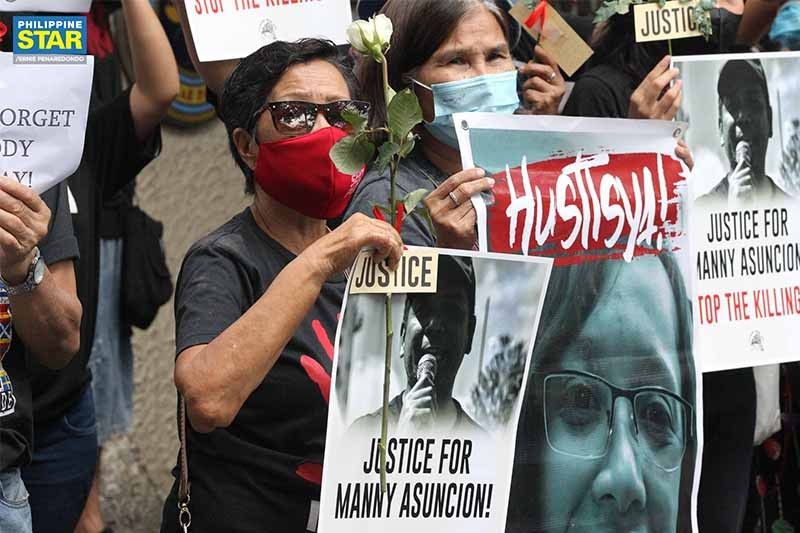Debate over Anti-EJK bill: OSG pushes penal code amendment, groups demand separate law

MANILA, Philippines — Should extrajudicial killings be defined and criminalized through a separate bill or integrated into the Revised Penal Code?
The Commission of Human Rights (CHR) and rights groups argue that a standalone bill would address EJKs as a systemic issue, while some legal and law enforcement agencies are concerned about the prosecutorial process.
The House Committee on Justice has been holding hearings to deliberate on House Bill 10986, the Anti-Extrajudicial Killings Act, filed by the Quad Committee investigating the Duterte administration's war on drugs and EJKs.
Avoiding ‘double jeopardy’
On Wednesday, January 22, the Office of Solicitor General (OSG) suggested to the justice panel to amend the RPC to include extrajudicial killings (EJKs) as crimes against persons.
“The OSG respectfully recommends to harmonize HB 10986 under a unified code with a Revised Penal Code, which is the legal framework for the prosecution and penalizing of crimes,” Assistant Solicitor General Cielo Rondain said.
She explained that amending the RPC would streamline the process of holding public officials accountable for EJKs. A special law, she warned, could lead to “jurisdictional confusion” in applying the law.
“So should the prosecution fail to prove all the elements of EJK, the accused can still be convicted of murder under Article 248,” Rondain added, referring that EJK can qualify under the crime of murder.
The OSG emphasized that the amended RPC would still define EJKs according to international law, outlining the elements of the crime, the types of perpetrators and corresponding penalties similar to those in the bill.
“The attendant qualifying circumstances of treachery, evident premeditation, and abuse of superior strength, among others, which are actually the qualifying circumstances in murder under Article 248 will actually be included as elements of the EJK,” Rondain said.
However, if the bill becomes a special law rather than amending the RPC, the OSG said an EJK defendant could no longer be indicted for murder under the RPC due to the risk of double jeopardy — being prosecuted twice for the same crime — which is unconstitutional.
The National Bureau of Investigation also expressed its support for the OSG’s proposal.
EJK as a ‘distinct crime’
The CHR and human rights groups opposed the OSG's proposal, arguing that it fails to acknowledge the systemic nature and gravity of EJKs.
For them, it is crucial to make EJK as an “independent and distinct crime” from murder through the Anti-Extrajudicial Killings Act.
“This stance is more compelling as it recognizes the unique nature of EJK and the systemic issues underlying it. More so, firstly, the element of public official involvement is a defining characteristic of EJK,” CHR Director IV Jasmin Navarro-Regino told the panel.
If EJKs were only considered as an “aggravating, qualifying circumstance,” she said it would overlook the systemic nature of the crime, reducing it to an individual offense.
“This approach fails to address the underlying issues of impunity, abuse of power, and state-sanctioned violence,” Navarro-Regino added.
The CHR stressed that the bill would promote “more effective investigations and prosecutions” to hold perpetrators accountable.
Agreeing with the CHR, National Union of People's Lawyers (NUPL) said defining and criminalizing the commission of EJK through a separate law, rather than the RPC, would also highlight the command responsibility of superior officers.
“Instead of merely holding accountable for administrative negligence, superior officers of those involved in the commission of EJKs should be held criminally liable under the principle of common responsibility,”
Cortez said amending the RPC to make EJK an aggravating circumstance for murder would lead to difficulties in investigating and prosecuting such cases.
The National Police Commission and the Philippine National Police expressed their support for the Anti-Extrajudicial Killing Act during the committee hearing.
Following the Quad Committee's recommendation to file crimes against humanity charges against perpetrators for the drug war's EJKs, which rights groups estimate at 30,000, the Department of Justice has been building cases and studying potential charges.
- Latest
- Trending





























